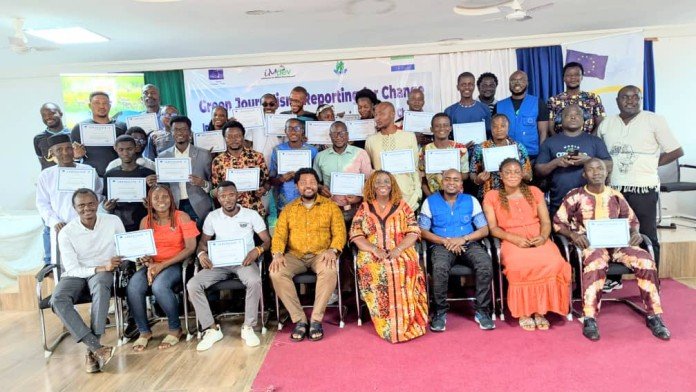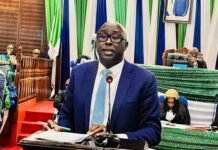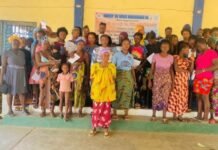By Amin Kef (Ranger)
Twenty-five journalists from various media outlets across Sierra Leone have on November 1, 2024 successfully completed an intensive Green Journalism Training program in Kenema City, organized by Initiatives for Media Development (IMdev) and the Sierra Leone Association of Journalists (SLAJ), with funding from the European Union. This initiative aims to equip journalists with the skills necessary to effectively report on environmental issues, raise public awareness and inspire action regarding Sierra Leone’s urgent environmental challenges.
The five-day training covered vital topics such as environmental regulations, institutional mandates, sustainable development, climate change and multimedia storytelling. Participants engaged in practical learning through field visits to Tiwai Island Wildlife Sanctuary in Barri Chiefdom, Pujehun District and Kambui Hills Forest Reserve in Nongowa Chiefdom, Kenema District, where they encountered real-world environmental management challenges.
“Environmental journalism is crucial in addressing the pressing issues facing Sierra Leone and the world,” stated SLAJ President Ahmed Sahid Nasralla. “This training not only equips journalists with the skills they need to tell these important stories but also empowers them to advocate for sustainable environmental management and change in their communities.”
Participants received expert guidance on crafting impactful stories that resonate with local audiences, emphasizing the relevance of global issues such as climate change and deforestation to their communities. The training also included multimedia skills development, equipping journalists with software tools for data presentation and analysis, as well as techniques to leverage video, audio and social media for enhanced audience engagement.
A key highlight of the program was the networking opportunities fostered among journalists, establishing a robust network of environmental reporters in Sierra Leone. “We are building a network of environmentally conscious journalists who will continue to support each other and promote green reporting long after this training,” said John C. Abu-Kpawoh from the Rural Development and Infrastructure Section of the European Union. “Our goal is to create lasting impacts and we believe these journalists will help lead the way.”
In addition to the training, a fellowship program was launched to encourage journalists to report on environmental issues and facilitate the formation of a Network of Environmental Journalists. With ongoing support from SLAJ and IMdev, these journalists are positioned to drive a powerful movement for sustainable development through journalism, fostering greater environmental awareness and accountability across Sierra Leone.
This training is particularly timely in light of the Sierra Leone Presidential Initiative on Climate Change, Renewable Energy and Food Security, which will kick off a National Dialogue on November 4, led by President Julius Maada Bio. The European Union is strongly supporting this dialogue, which will require media involvement to effectively relay its content and messages.
EU Ambassador to Sierra Leone, Jacek Jankowski, affirmed the EU’s commitment, stating, “The European Union is dedicated to providing significant funding to support green transition efforts, particularly related to environmental protection, climate change mitigation and adaptation, renewable energy, and sustainable agriculture through a range of ongoing projects in Sierra Leone.”
The European Union extends its appreciation to the Ministry of Environment and Climate Change, SLAJ, the Independent Media Commission of Sierra Leone, local stakeholders and other partners for their invaluable contributions during the week-long training.




